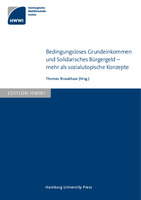Bedingungsloses Grundeinkommen und Solidarisches Bürgergeld – mehr als sozialutopische Konzepte
Author(s)
Straubhaar, Thomas
Hohenleitner, Ingrid
Opielka, Michael
Schramm, Michael
Collection
AG UniversitätsverlageLanguage
GermanAbstract
Thomas Straubhaar and Ingrid Hohenleitner outline in this publication the model of an unconditional basic income grant. They show that it is affordable for Germany. They see the basic income as an opportunity to reorganize the government budget and the welfare state in a sustainable way for future generations. They show that there could be particularly in the field of low income jobs new jobs be created in the amount of up to 1.17 million full-time positions.
Michael Opielka sees in the model by Althaus "a kind of a combination wage for all". A part of the national income will be evenly distributed. With a "mixture of pragmatism and idealism", the basic income create a "true" labor market, while rewarding part-time work and securing volunteering and educational phases.
The basic income proposed by Dieter Althaus would be an important step on the path to greater social solidarity, to more subsidiarity, and tomore (social) justice. This is the conclusion reached by Michael Schramm. Also the system of social protection would be based on an economically sound basis and a revitalization of the labor market and entrepreneurial forces would follow. Thomas Straubhaar und Ingrid Hohenleitner skizzieren das Modell eines bedingungslos gewährten Grundeinkommens. Sie zeigen, dass es auch für Deutschland finanzierbar ist. Sie sehen im Grundeinkommen die Chance, den Staatshaushalt nachhaltig zu sanieren und den Sozialstaat auch für künftige Generationen wieder finanzierbar zu machen. Sie zeigen, dass insbesondere im Niedriglohnbereich neue Arbeitsplätze im Umfang von bis zu 1,17 Millionen Vollzeitstellen geschaffen werden könnten. Michael Opielka sieht im Modell von Althaus „eine Art Kombilohn für alle“. Ein Teil des Volkseinkommens werde auf alle verteilt. Mit einer „Mischung aus Pragmatismus und Idealismus“ schaffe das Solidarische Bürgergeld einerseits einen „echten“ Arbeitsmarkt, mache zugleich aber Teilzeitarbeit lohnend und sichere freiwilliges Engagement und Bildungsphasen ab. Mit dem Solidarischen Bürgergeld führe die Lohndifferenzierung im unteren Einkommensbereich nicht mehr zu Armut.
Das Solidarische Bürgergeld von Dieter Althaus wäre ein wichtiger Schritt auf dem Wege zu mehr gesellschaftlicher Solidarität, zu mehr Subsidarität und zu mehr (sozialer) Gerechtigkeit. Zu diesem Fazit kommt Michael Schramm. Zudem würde das System der sozialen Sicherung auf eine ökonomisch tragfähige Basis gestellt und eine Belebung des Arbeitsmarktes sowie der unternehmerischen Kräfte bewirkt.
Keywords
schramm; social welfare; social security; sozialpolitische revolution; negative income tax; hohenleitner; basic income guarantee; straubhaar; grundeinkommen; solidarisches bürgergeld; sozialsystem; opielka; sozialstaat; althaus; negative einkommensteuer; soziale sicherheit; Arbeitslosigkeit; ArbeitsmarktDOI
10.15460/HUP.HWWI.1.69ISBN
9783937816470OCN
808383436Publisher
Hamburg University PressPublication date and place
2008Classification
Society and Social Sciences


 Download
Download